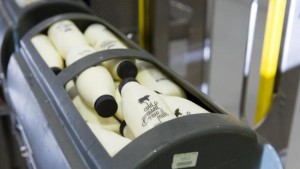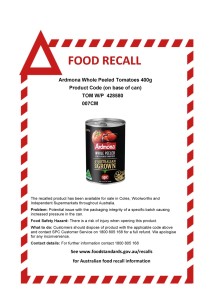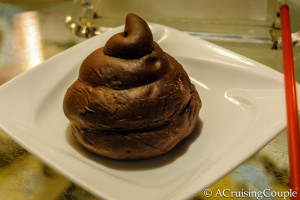Everything is bigger in Australia. Even the STDs.
And politicians carping about the bloody carp.
And people are still surprised about outbreaks on lettuce and sprouts.

Everything is bigger in Australia. Even the STDs.
And politicians carping about the bloody carp.
And people are still surprised about outbreaks on lettuce and sprouts.
John Flint of PerthNow reports Indonesian prawns sold to consumers in Australia contained trace elements of cooling water from a nuclear power plant, forensic tests uncovered.
 Dr John Watling, chief scientist with TSW Analytical, was surprised by the discovery, but believes food fraud is commonplace.
Dr John Watling, chief scientist with TSW Analytical, was surprised by the discovery, but believes food fraud is commonplace.
Dr Watling, formerly Winthrop Professor of Forensic and Analytical Chemistry at the University of WA, estimates that one-third of what we put in our shopping trolleys isn’t what it claims to be.
“With the Indonesian prawns, some exhibited the elemental signature of having been grown in the cooling water from a nuclear power station,” Dr Watling told The Sunday Times this week. “As there isn’t a nuclear power station in Indonesia they obviously didn’t come from Indonesia.
“The prawns were not toxic — we’re not talking about prawns that glow in the dark. But their elemental fingerprint indicated that they were not grown where the label said they were.”
Food fraud is so lucrative that organised crime syndicates are now involved, TSW Analytical’s chief executive Cameron Scadding says.
Mr Scadding, also a forensic chemist, said the explosion in demand for healthy and ethically produced foods is also being exploited.
The booming industry around expensive organic produce is expected to exceed $US100 billion this year. It’s hardly a surprise then, Mr Scadding said, to see cheaply produced foods passed off as organic.
“Given the premium and the demand for this sort of food it is very open to economically motivated substitution as, after all, the organic carrot looks the same as the cheaper non-organic one,” he said.
It’s not just what we eat, but what we love to drink. Australian wines, for example, are ripe for rorting.
“There are some wines that haven’t even seen a vineyard. They’re just fabricated wines,” Dr. Watling said.
Dr Watling and Mr Scadding, who co-founded TSW Analytical 10 years ago, recently launched Source Certain International with Colorado-based Glenn McClelland, to lead the fightback against food fraud globally. From their WA base in Bibra Lake, they’ve established offices in Singapore and the US.
They use their technology, TSW Trace, to determine a unique trace elemental fingerprint from food samples to determine their origin.
 Developed by Dr Watling over 30 years, it can pinpoint where in the world the ingredients come from.
Developed by Dr Watling over 30 years, it can pinpoint where in the world the ingredients come from.
The same technology has even been used, outside of food, to identify gold fraud. In 2010, WA Police hailed it as crucial in thwarting an international gold heist and credited Dr Watling with pioneering gold fingerprinting.
At the time, Dr Watling told The Sunday Times his technology had saved the global gold industry about $1 billion.
The food industry has even more to lose. Food scandals, such as the frozen berries hepatitis A scare last year, can decimate a business and destroy trust in an entire industry.
The fallout from the hepatitis A outbreak — involving 34 Australians, including two in WA — was felt by businesses in the frozen berries market, as shoppers stopped buying them.
Every time I publicly complain about the lack of information in Australian food safety notices, someone writes in to say, people got the information they needed, and how can you have any dessert if you don’t eat your pudding.
 So in the wake of two outbreaks involving raw sprouts packaged in South Australia that sickened over 300 Aussies with Salmonella, the New South Wales Food Authority advises us plebes that Forest Gate Organics has recalled its Mung Bean Sprouts from fruit and vegetable stores and health food stores in NSW, QLD and VIC due to microbial (Salmonella) contamination.
So in the wake of two outbreaks involving raw sprouts packaged in South Australia that sickened over 300 Aussies with Salmonella, the New South Wales Food Authority advises us plebes that Forest Gate Organics has recalled its Mung Bean Sprouts from fruit and vegetable stores and health food stores in NSW, QLD and VIC due to microbial (Salmonella) contamination.
No information if anyone is sick. No information on how this Salmonella positive was detected. Nothing. How will anyone learn?
The New South Wales Food Authority has defended its decision to approve the sale of an unpasteurised milk product, saying the company involved was subject to a two year, rigorous approval process.
 It is being marketed as “cold pressed raw milk” and leading experts have expressed concern about a lack of research proving the cold pressure process was as effective as traditional pasteurisation.
It is being marketed as “cold pressed raw milk” and leading experts have expressed concern about a lack of research proving the cold pressure process was as effective as traditional pasteurisation.
But CEO of the New South Wales Food Authority Dr Lisa Szabo said the product had been approved only after two years of rigorous consultation.
“We asked them ‘well what are the hazards that they’re trying to control in the milk’, and this company had a really strong and comprehensive list of the microbiological hazards that they wanted to control,” Dr Szabo said.
Dr Szabo worked as a research scientist with the CSIRO and said “for five years of my time there I spent doing research on high pressure, and in particular its effect on micro-organisms.
“So I have a great deal of confidence that this particular processing technology can inactivate micro-organisms.”
High pressure processing has been used for other products for a long time and Dr Nidhi Bansal from the University of Queensland’s School of Agriculture and Food Sciences said it has been quite successful.
“Obviously it hasn’t been commercialised for milk yet. So there could be some concern about it, but as long as the company can prove that it is microbiologically safe then I don’t see an issue with that,” Dr Bansal said.
Saxon Joye, the owner of the company approved to sell unpasteurised milk and said his product was not quite “raw milk,” it had just not gone through the traditional pasteurisation process, where milk is exposed to high temperatures.
“We take our raw milk, and we put it under our cold pressure. If there’s any harmful pathogens or bacteria, we remove it during that process,” he said.
“Good herd management, hygienic milking techniques and the cold pressure method have meant we can put 100 per cent safe, raw milk onto supermarket shelves,” said Mr Joye.
“The bottles of milk are placed under enormous water pressure, squashed in about 15 per cent, to remove the harmful micro-organisms.”
Professor Peter Collignon, a leading infectious disease physician and microbiologist, said he was concerned about the lack of research showing the efficacy of cold pressure.
“I do worry this is a marketing exercise for raw milk but without the science to show the process is anywhere near as good as pasteurisation,” he said.
“The [data and research] that shows [cold-pressure is just as good as pasteurisation] needs to be robust and available for all to see, including the public, and needs independent verification.”
The Food Authority’s spokeswoman did not directly answer questions about releasing data to support its decision to approve the new method.
Mermaid Beach is a lovely spot on Australia’s Gold Coast.
 This Thai restaurant, not so much.
This Thai restaurant, not so much.
Alexandria Utting of the Gold Coast Bulletin reports Mermaid Beach restaurant Bangkok Thai was the subject of legal proceedings in the Southport Magistrates Court after business owner Vinya Chantra (right) and the company to which he is a director, Chantra Enterprises, were charged with three counts of failing to comply with food standards codes.
The charges came after council inspectors found the popular Thai restaurant in a “gross level of filth” with food waste, dirt, grime and rodent droppings on tables used to prepare food.
The court heard the restaurant had received improvement notices for cleanliness on several occasions since September 2012, but had only paid one fine of $580 for a breach of food safety laws in 2015.
Magistrate John Costanzo individually fined Chantra $2,955 for allowing food safety breaches in his business.
He was also ordered to pay $1,250 to council in costs and $89.90 for the filing of court documents.
The company Chantra Enterprises was separately fined $14,725, as well as costs and filing fees.
In 1986, when I became editor of the University of Guelph student paper, The Ontarian, we were still using that old aggie joke, Guelph: Where men are men and sheep are afraid.
 I taunted myself for using that line in a food safety video recorded in 2000.
I taunted myself for using that line in a food safety video recorded in 2000.
Yet in Australia, in 2016, sheep do need to be afraid.
Farming and animal welfare groups have slammed a Sydney school after vision emerged of students tackling and wrestling sheep and rams during a rugby training camp.
The ABC obtained videos showing first and second XV players from Sydney’s prestigious King’s School in Parramatta chasing rams in a farm paddock and dragging them into designated squares before flipping them over.
The videos were reportedly posted on a Facebook page by teacher and coach James Hilgendorf and ex-professional Hugh Perrett, but were taken down when the ABC contacted the school on Wednesday.
RSPCA chief executive Steve Coleman was disgusted by what he saw.
President of the NSW Farmers’ Association Derek Schoen said farmers would have watched the vision “with horror”.
“This is unacceptable animal husbandry practice. You’d never treat your stock like that and I would say most concerned farmers would view that with a bit of horror,” Mr Schoen said.
“It’s distressing to the animals. It will make future husbandry practices more difficult with the animals — they’ll remember what has happened in those yards.
“To have rams running around with a whole lot of school kids I think is just plain stupid.”
Understandably, viewers who saw the footage on ABC on Thursday night were outraged.
Despite this response, the school’s headmaster Dr Tim Hawkes said he had no problem with the practice.
“A strength and team-building exercise devised by the farmer involved the boys having to undertake a task not dissimilar to that undertaken by shearers,” Hawkes said in a statement to the ABC.
“The task was supervised closely by the farmer who gave instructions to the boys as to how this task should be done.
“The two rugby coaches involved were assured by the farmer beforehand that the activity was safe and all the more so because he would be supervising it carefully.
“No animals were injured in the exercise. Neither were any boys.”
To head-master Dr Tim Hawkes: Your title says it all.
At the end of April 2016, South Australia Health’s chief medical officer Paddy Phillips said after an outbreak of Salmonella Saintpaul linked to sprouts sickened over 300, “This business was completely compliant with all our investigations and there is no reason to believe there are any further issues with the production of bean sprouts at this factory.”
 This is the factory (right, exactly as shown). I keep saying it’s like 1978 here, and there’s probably a VW microbus out back loaded with Salmonella-infectd sprout plants.
This is the factory (right, exactly as shown). I keep saying it’s like 1978 here, and there’s probably a VW microbus out back loaded with Salmonella-infectd sprout plants.
Today, SA Health is once again urging the public to throw out their bean sprouts after a dramatic surge in salmonella cases and discovery of the dangerous bacteria in packaged sprouts sold by Thebarton producer Star Tu — the second time it has been detected at the producer this year.
Officials have ordered Star Tu to recall all of its products and stop selling immediately after Salmonella Saintpaul samples were found in packaged bean sprouts.
A packager of Star Tu products, Sunshine Sprouts, has also been ordered by SA Health to stop selling any products containing Star Tu mung bean sprouts.
SA Health chief public health officer Professor Paddy Phillips said the public should either throw out their bean sprouts or return them to the place of purchase.
Since the start of last December there have been 271 cases of confirmed Salmonella Saintpaul notified to SA Health resulting in 47 people being admitted to hospital.
South Australia usually sees around 15 to 20 cases each year.
 “Our investigations then led us to the Star Tu factory and we found a positive Salmonella sample taken from a piece of equipment. Once this was cleaned and further inspections took place there was no evidence indicating any further risk.
“Our investigations then led us to the Star Tu factory and we found a positive Salmonella sample taken from a piece of equipment. Once this was cleaned and further inspections took place there was no evidence indicating any further risk.
Dumbass.
Finding Salmonella on a piece of equipment in no way provides confidence that the problem has been solved and shows a complete lack of knowledge of how raw sprouts become contaminated at seed.
But that’s why Paddy gets the big bucks.
“Yesterday it was confirmed that since these investigations, five sealed bags produced by Star Tu were contaminated with Salmonella, and given this new evidence we have issued this factory with an order to recall and stop selling. We are also today advising South Australians to either throw out their bean sprouts or return them to the place of purchase and we are recalling all products that have come from this factory.
Li Tu, whose family owns the Star Tu business, said it had been “growing and distributing high quality bean sprouts for over 20 years”.
“As well as meeting SA Health standards, we also have had robust food safety programs since 1999 with annual checks and inspections,” he said.
 “Our factory was described as being as clean as a hospital by one of SA Health’s employees.
“Our factory was described as being as clean as a hospital by one of SA Health’s employees.
“We’re obviously not in the business of making people sick so we do not take this matter lightly. We are working closely with SA Health to find the source of the problem.”
Bullshit.
Raw sprouts are an unnecessary health hazard. But they are happily served up at hospitals and aged-care facilities and other places where the immunocompromised can be found in oblivious Australia.
An updated table of raw sprout related outbreaks is available at: https://barfblog.com/wp-content/uploads/2016/04/Sprout-associated-outbreaks-4-27-16.xlsx
Never underestimate the power of denial.
Erdozain, M.S., Allen, K.J., Morley, K.A. and Powell, D.A. 2012. Failures in sprouts-related risk communication. Food Control. 10.1016/j.foodcont.2012.08.022
http://www.sciencedirect.com/science/article/pii/S0956713512004707?v=s5
Nutritional and perceived health benefits have contributed to the increasing popularity of raw sprouted seed products. In the past two decades, sprouted seeds have been a recurring food safety concern, with at least 55 documented foodborne outbreaks affecting more than 15,000 people. A compilation of selected publications was used to yield an analysis of the evolving safety and risk communication related to raw sprouts, including microbiological safety, efforts to improve production practices, and effectiveness of communication prior to, during, and after sprout-related outbreaks. Scientific investigation and media coverage of sprout-related outbreaks has led to improved production guidelines and public health enforcement actions, yet continued outbreaks call into question the effectiveness of risk management strategies and producer compliance. Raw sprouts remain a high-risk product and avoidance or thorough cooking are the only ways that consumers can reduce risk; even thorough cooking messages fail to acknowledge the risk of cross-contamination. Risk communication messages have been inconsistent over time with Canadian and U.S. governments finally aligning their messages in the past five years, telling consumers to avoid sprouts. Yet consumer and industry awareness of risk remains low. To minimize health risks linked to the consumption of sprout products, local and national public health agencies, restaurants, retailers and producers need validated, consistent and repeated risk messaging through a variety of sources.
The six of us were returning from IAFP in San Diego in 2002.
It wasn’t a fun trip, and after returning I proclaimed, that’s it, we’re getting a divorce.
 But before such bravado, we were waiting in line at the San Diego airport, and one of the kids hurled.
But before such bravado, we were waiting in line at the San Diego airport, and one of the kids hurled.
Everywhere.
It was a mess, and we helped clean up.
We all have those stories — maybe not the divorce part — but Imagine if that happened in a restaurant?
It did to an Australian family at The Glasshouse Bistro on Queensland’s Sunshine Coast.
Ms Harnett wrote that her son became ill and vomited on the floor while they were waiting for their food.
She said she didn’t expect staff to clean it up, but she was left shocked when she had to pay extra to do it herself.
 She wrote: “One of the waitresses gave me paper towel and a wet towel. I cleaned it up and she came back with plastic bags for me to dispose of. All fine with that.
She wrote: “One of the waitresses gave me paper towel and a wet towel. I cleaned it up and she came back with plastic bags for me to dispose of. All fine with that.
“The lady in charge comes over after we’d finished eaten and said, I heard you had a little accident. The standard charge in any restaurant is $30 if you want us to finish cleaning up.”
Ms Harnett said she mopped the floor herself and claims when she went to pay her bill was increased by $10 as someone had to disinfect the mop.
“I was taken aback,” she told The Chronicle.
“They could have shown a bit of compassion.”
According to the publication a spokesman from the eatery said: “The incident caused us a loss of income because that section for the restaurant wasn’t able to be used for a period of time.”
The restaurant reportedly acknowledges the situation would have been embarrassing for the family, and that it was an unfortunate situation for both parties.
“We thought at the time that our nominal charge of $10 was fair considering we had to allocate a staff member to clean up the mess to our satisfaction after they left – to make sure the area was properly sterilised.”
The spokesperson reportedly said the cost to the restaurant was more than $10 and the staff member who sterilised the area after the family left felt unwell and had to sit outside.
“If we were given that set of circumstances again, we probably wouldn’t charge $10 but just accept it as our lot,” the spokesperson reportedly said.
In response to the news, the Sunshine Coast Daily asked other restaurants of their policy and found many were surprised by the bistro’s decision to charge a customer extra for cleaning after her child vomited on the premises.
Dion Spadaro, general manager of The Boat Shed at Cotton Tree, was shocked to hear that a Montville bistro had charged a customer for the loss of space and staff time while the mess was cleaned up.
“It’s not something that we would do. It’s not like we don’t have buckets and cleaning equipment,” Mr Spadaro said.
 “We look after our customers whatever their needs are.
“We look after our customers whatever their needs are.
“If customers make a mess in the toilet, we clean that up. If someone makes a mess elsewhere, we clean that up, that’s what we do.”
Gavin Murray, of Murray’s Cafe, at Cotton Tree, said there was “no way in the world” he would charge a fee for cleaning up after a child had vomited at his business.
“On the weekend, we had a mum whose little girl was sick at the table. She made it to the toilets but must have made a bit of a mess. The mum was very apologetic and we said it’s not a problem,” Mr Murray said
“We ran out, grabbed the mop and bucket and between us, got it done and got back to work.
“We’ve all been there, we’ve all got kids.
“There’s no way we would charge someone for their child being sick. It’s something that no-one can predict. You just deal with it.”
Michael Mulhearne, the owner of Tides Waterfront Dining at Caloundra, said the restaurant business was about customer service and he would not charge a fee to clean up after a customer.
“I understand it but I wouldn’t do it,” he said.
“They are going to lose that customer for life, they have lost a heap of other customers. They are not going to get anything good out of it except for their name in the paper.”
Another restaurant figure, who declined to be named, was also surprised at the fee.
“We would never do that in our restaurant. If the mum helped clean up, even better, but we would never charge them,” she said.
Five people shared their thoughts with the Sunshine Coast Daily on cleaning up after unfortunate incidents involving bodily fluids:
“Let me tell you about cleaning up other peoples’ mess,” he said.
“Name an orifice and I’ll paint you a picture.”
Mr Hebron said making a mess was an unfortunate consequence of life.
“We eat, we poo and sometimes things don’t go to plan in between … and out it all comes to much fanfare (in my case) and colour,” he said.
“I have had people offer to clean up their mess and very reluctantly decline, because I’m the one in charge.
“I’m the one with the keys. I’m the one who will get it done in short order and put out the yellow cone.”
Of course it’s in Australia, where else would they be called tinned rather than canned tomatoes?
 A potentially explosive batch of Australian tinned tomatoes has been pulled from supermarket shelves.
A potentially explosive batch of Australian tinned tomatoes has been pulled from supermarket shelves.
A packaging problem has been detected in a batch of 400g SPC Ardmona whole peeled vine ripened tomatoes, causing increased pressure in the cans.
Customers have been warned there is a risk of injury when opening the cans, which are sold at Coles, Woolworths and IGA stores across the country.
SPC said the issue applied only to the packaging in one batch and there was no food-safety risk related to the product.
The affected products have the code TOM W/P 428580 007CM on the tin’s base.
Australia take note: Even though Toronto, Los Angeles and New York City have all figured out mandatory disclosure of restaurant inspection grades on the door – you know, when people might actually make a decision – the Brits and Aussies opted for a voluntary system, so if a restaurant gets a 2-out-of-5 it’s just not posted.
 Wales already has a mandatory system and Northern Ireland will have one in October.
Wales already has a mandatory system and Northern Ireland will have one in October.
But not England or Scotland.
The Telegraph reports that the UK government came under pressure last night from council leaders who called for a change in the law to force high-class establishments – even Michelin starred ones — to publicise their hygiene rankings in a bid to reduce the risk of diners eating unsafe food and becoming ill.
The change would affect all restaurants but those with Michelin stars are set to be hit particularly hard, as research by the Food Standards Agency (FSA) shows their rankings are generally lower than many familiar chain restaurants.
I repeat, Michelin-starred restaurants generally rank lower than chain restaurants.
Fancy food ain’t safe food.
In December, FSA found 83pc of high street chains were given the best rating of five out of five, compared to just 55pc of Michelin star restaurants.
Michelin stars, a mark of exceptional quality food, are awarded to businesses by mystery shoppers and are judged independently of the official hygiene ratings.
Safety and quality are altogether different measures.
(Safety and quality are different measures, see below.}
The FSA said all businesses should be able to reach this top rating of five.
But Bruce Poole, owner of Chez Bruce, a Michelin star restaurant in Wandsworth with a hygiene rating of lower than five, defended top restaurants which did not score top marks.
 He said: “It is very difficult for restaurants like ours as unlike high street chains which have restricted menus, we have fresh food coming through the day – sometimes up to 70 different items. We have to be able to show that all these pieces of produce have been handled correctly. For example we were downgraded from five stars because we couldn’t prove that we had frozen some fish at the correct temperature.”
He said: “It is very difficult for restaurants like ours as unlike high street chains which have restricted menus, we have fresh food coming through the day – sometimes up to 70 different items. We have to be able to show that all these pieces of produce have been handled correctly. For example we were downgraded from five stars because we couldn’t prove that we had frozen some fish at the correct temperature.”
Simon Blackburn, Blackpool councilor and chairman of the Local Government Association safer and stronger communities board, said: “It’s not always easy for people to judge hygiene standards simply by walking through the front door of a premise and know whether they are about to be served a ‘dodgy’ meal that could pose a serious risk to their health.”
An FSA spokesperson said: “We very much favour making this system compulsory in England too, as we believe this will be better for consumers. It will also be better for businesses that achieve good standards as they will get more recognition and it will increase the spotlight on those not meeting the grade.”
“Anyone in England who sees a business without a hygiene rating sticker currently has to decide if they want to eat or buy food there without knowing what’s going on in the kitchen” said councillor Simon Blackburn, the chair of the LGA’s safer and stronger communities board.
“It’s not always easy for people to judge hygiene standards simply by walking through the front door of a premise and know whether they are about to be served a ‘dodgy’ burger or kebab that could pose a serious risk to their health.
“Councils always take action to tackle poor or dangerous hygiene and improve conditions and see first-hand what shockingly can go on behind closed doors at rogue food premises.
 “Businesses have recently been prosecuted for being riddled with mice or cockroach infestations, rodent droppings on food and caught with a chef smoking when preparing food.”
“Businesses have recently been prosecuted for being riddled with mice or cockroach infestations, rodent droppings on food and caught with a chef smoking when preparing food.”
Mandatory display of food hygiene ratings is supported by the consumer organization Which?, the Chartered Institute for Environmental Health and many environmental health officers.
Last year Gordon Ramsay’s Maze restaurant in Mayfair, London, scored just two out of five after inspectors found cockroaches on the premises. Immediate steps were taken and Maze now scores top marks.
The LGA released details of recent food safety breaches, including in Croydon where more than 100 food outlets failed to meet expected hygiene standards last year, including 22 on a single street.
Over to you, Australia.